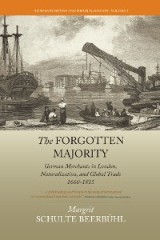Details

The Forgotten Majority
German Merchants in London, Naturalization, and Global Trade 1660-1815Studies in British and Imperial History, Band 3 1. Aufl.
|
38,99 € |
|
| Verlag: | Berghahn Books |
| Format: | |
| Veröffentl.: | 01.10.2014 |
| ISBN/EAN: | 9781782384489 |
| Sprache: | englisch |
| Anzahl Seiten: | 326 |
DRM-geschütztes eBook, Sie benötigen z.B. Adobe Digital Editions und eine Adobe ID zum Lesen.
Beschreibungen
<p> The “forgotten majority” of German merchants in London between the end of the Hanseatic League and the end of the Napoleonic Wars became the largest mercantile Christian immigrant group in the eighteenth century. Using previously neglected and little used evidence, this book assesses the causes of their migration, the establishment of their businesses in the capital, and the global reach of the enterprises. As the acquisition of British nationality was the admission ticket to Britain’s commercial empire, it investigates the commercial function of British naturalization policy in the early modern period, while also considering the risks of failure and chance for a new beginning in a foreign environment. As more German merchants integrated into British commercial society, they contributed to London becoming the leading place of exchange between the European continent, Russia, and the New World.</p>
<p> List of Illustrations<br> List of Tables<br> Preface<br> Acknowledgments<br> Abbreviations</p>
<p> <strong>Introduction</strong></p>
<p> Sources and Outline<br> <br> <strong>Chapter 1.</strong> <strong>Naturalizing Newcomers for Prosperity (1660-1818)</strong></p>
<ul>
<li> Early Modern English Naturalization Law</li>
<li> Naturalized Subjects: Their Numbers and Native Lands</li>
<li> The Occupations of German Immigrants who became English Subjects</li>
</ul>
<p> <strong>Chapter 2. Furthering Anglo-German Trade in the Seventeenth Century</strong></p>
<ul>
<li> Reorganizing Anglo-German Trade during the 1600s</li>
<li> London’s German Merchants after 1660</li>
<li> Lack of Trust and Understanding: Challenges for Both Sides</li>
<li> German Merchant Trade in London</li>
<li> Trading Regions and Commodities</li>
<li> Late-Seventeenth-Century German Trade Networks</li>
<li> German Merchants and London Trade Companies</li>
<li> Fighting Regulated Companies</li>
<li> Politics and Commerce</li>
</ul>
<p> <strong>Chapter 3. Eighteenth-Century German Houses and Trade</strong></p>
<ul>
<li> London’s German Trade Houses</li>
<li>     Starting out in London: The Way to Independence</li>
<li>     Trade Houses and Partners</li>
<li> Chain Migration, Successors, and Transnational Alliances</li>
<li> A German Perspective on the Development of Bilateral Trade</li>
<li> The Rise and Organization of Early “Merchant Empires”</li>
<li>     Connecting Colonial Empires</li>
<li> Early Merchant Empires – flexible and vulnerable</li>
</ul>
<p> <strong>Chapter 4. German Merchants in the Levant and Russia Companies</strong></p>
<ul>
<li> British Trade with Russia and the Levant</li>
<li> Naturalized Merchants in the Levant Company</li>
<li> Naturalized Merchants in the Russia Company</li>
<li> The Russia Company’s Struggle with Naturalization Practices</li>
<li> Naturalized Citizens and the Russia Company’s Office in St. Petersburg</li>
<li> The Bank of Scotland’s Right to Naturalize</li>
</ul>
<p> <strong>Chapter 5.</strong> <strong>Favorable Markets and Bankruptcy</strong></p>
<ul>
<li> Insurance and Trade at London’s German Trade Houses</li>
<li> London’s Early Insurance Business</li>
<li> Networking Europe with the Americas and Asia</li>
<li> The Bankruptcy Trend and the Naturalized Subjects’ Bankruptcies</li>
<li> Waves of Bankruptcy during the Coalition Wars</li>
<li> The Size of Failed Trade Houses during the Era of the Coalition Wars</li>
<li>     Muilman & Nantes</li>
<li>     Theophilus Blanckenhagen</li>
<li>     Persent & Bodecker</li>
<li>     Oom, Hoolboom, Knoblock & Co. and Hippius & Co.</li>
<li> Estates of the Failed</li>
<li> Certificate of Conformity and Brokering Commodities: Starting all over</li>
<li> Commodity Brokers and the Freedom of the City</li>
</ul>
<p> <strong>Conclusion</strong></p>
<p> Historical Sources<br> Bibliography<br> Index</p>
<p> <strong>Introduction</strong></p>
<p> Sources and Outline<br> <br> <strong>Chapter 1.</strong> <strong>Naturalizing Newcomers for Prosperity (1660-1818)</strong></p>
<ul>
<li> Early Modern English Naturalization Law</li>
<li> Naturalized Subjects: Their Numbers and Native Lands</li>
<li> The Occupations of German Immigrants who became English Subjects</li>
</ul>
<p> <strong>Chapter 2. Furthering Anglo-German Trade in the Seventeenth Century</strong></p>
<ul>
<li> Reorganizing Anglo-German Trade during the 1600s</li>
<li> London’s German Merchants after 1660</li>
<li> Lack of Trust and Understanding: Challenges for Both Sides</li>
<li> German Merchant Trade in London</li>
<li> Trading Regions and Commodities</li>
<li> Late-Seventeenth-Century German Trade Networks</li>
<li> German Merchants and London Trade Companies</li>
<li> Fighting Regulated Companies</li>
<li> Politics and Commerce</li>
</ul>
<p> <strong>Chapter 3. Eighteenth-Century German Houses and Trade</strong></p>
<ul>
<li> London’s German Trade Houses</li>
<li>     Starting out in London: The Way to Independence</li>
<li>     Trade Houses and Partners</li>
<li> Chain Migration, Successors, and Transnational Alliances</li>
<li> A German Perspective on the Development of Bilateral Trade</li>
<li> The Rise and Organization of Early “Merchant Empires”</li>
<li>     Connecting Colonial Empires</li>
<li> Early Merchant Empires – flexible and vulnerable</li>
</ul>
<p> <strong>Chapter 4. German Merchants in the Levant and Russia Companies</strong></p>
<ul>
<li> British Trade with Russia and the Levant</li>
<li> Naturalized Merchants in the Levant Company</li>
<li> Naturalized Merchants in the Russia Company</li>
<li> The Russia Company’s Struggle with Naturalization Practices</li>
<li> Naturalized Citizens and the Russia Company’s Office in St. Petersburg</li>
<li> The Bank of Scotland’s Right to Naturalize</li>
</ul>
<p> <strong>Chapter 5.</strong> <strong>Favorable Markets and Bankruptcy</strong></p>
<ul>
<li> Insurance and Trade at London’s German Trade Houses</li>
<li> London’s Early Insurance Business</li>
<li> Networking Europe with the Americas and Asia</li>
<li> The Bankruptcy Trend and the Naturalized Subjects’ Bankruptcies</li>
<li> Waves of Bankruptcy during the Coalition Wars</li>
<li> The Size of Failed Trade Houses during the Era of the Coalition Wars</li>
<li>     Muilman & Nantes</li>
<li>     Theophilus Blanckenhagen</li>
<li>     Persent & Bodecker</li>
<li>     Oom, Hoolboom, Knoblock & Co. and Hippius & Co.</li>
<li> Estates of the Failed</li>
<li> Certificate of Conformity and Brokering Commodities: Starting all over</li>
<li> Commodity Brokers and the Freedom of the City</li>
</ul>
<p> <strong>Conclusion</strong></p>
<p> Historical Sources<br> Bibliography<br> Index</p>
<p> <strong>Margrit Schulte Beerbühl </strong>is Professor of Modern History of the University of Düsseldorf. Her publications include <em>Spinning the Commercial Web</em> (Frankfurt 2004, ed. with Jörg Voegele), <em>Migration and Transfer from Germany to Britain</em> (München 2007, ed. with Stefan Manz et al.),  and <em>Transnational Networks: German Migrants in the British Empire, 1670-1914</em> (Leiden 2012, ed. with Stefan Manz et al.).</p>


















